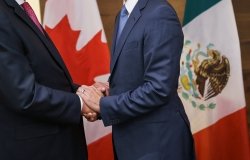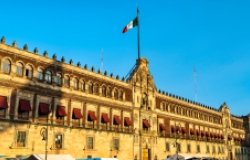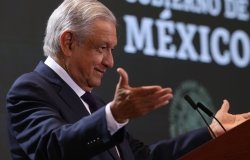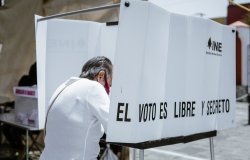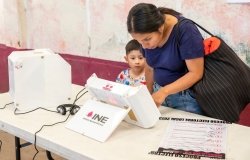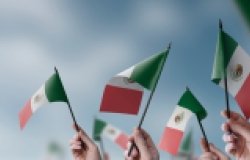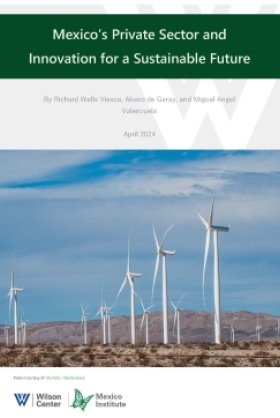Mexico Institute in the News: Mexico election: Economy matters as much as security
As Mexico's presidential race enters its home stretch towards the vote on 1 July, the issue of drug-related violence has not, as widely expected, dominated the campaign. The Mexico Institute's Duncan Wood explains how the economy is as important as security.
Many analysts believed that the drug war that has resulted in more than 50,000 deaths since 2006 would be the issue of the election.
Although the candidates have made frequent reference to the need to improve public safety and to reduce violence levels, it has been one issue among many.
Part of the explanation for this lies in the fact that the election is much more about personalities than issues, with one in particular, Enrique Pena Nieto of the Institutional Revolutionary Party (PRI) drawing national and international attention.
But just as importantly, this election reflects the Mexican electorate's judgement on 12 years of economic management by the current ruling party, the National Action Party (PAN).
In 2000, when the PAN's Vicente Fox was elected president, breaking with 71 years of PRI rule in Mexico, he promised to bring in a business-oriented agenda that would generate high levels of growth and one million jobs per year.
During his mandate, his government failed miserably to meet that goal.
Mexican economic growth remained mired in the range of 2.5% per year, and with around 30% of the Mexican population living in extreme poverty.
In the 2006 election, the candidate of the left-wing Party of the Democratic Revolution (PRD), Andres Manuel Lopez Obrador, capitalised on this failure.
AMLO, as he is often referred to, garnered massive support from Mexico's working classes, and came within a whisker of winning the presidency, losing by only 0.58% to Felipe Calderon of the PAN.
Success and failure
Mr Calderon's presidency was supposed to be marked by macroeconomic stability, high levels of growth, and low unemployment.
He has achieved a chequered record on all three.
On stability: the sound macroeconomic management has brought historically low inflation levels and one of the healthiest public debt profiles of any country in the world.
On growth: although the economy grew steadily through the first two years of the Calderon administration, with 2009 came a deep recession that saw the economy shrink by 6.5%.
The Mexican government received praise for the way in which it handled the economic crisis (which came at the same time as the H1N1 flu pandemic in the country), and the economy has recovered impressively since 2010.
But the drop in economic activity means that for the six years of his term, Mr Calderon can on average only point to around 1.8% growth per year.
Even before the crisis, Mexico's growth rates paled in comparison with the record of emerging powers such as China, India or Brazil.
On jobs: Mexican unemployment remains low by international standards (around 4.5%), but the problem of under-employment is persistent, with around 11% of the workforce either unable to find work or unable to survive on the wages they are paid.
Rich and poor
Of greater importance for the election, Mexico has been unable to find a lasting solution to the grinding poverty that afflicts so many parts of the country.
According to the government's own Coneval social evaluation agency, around 52 million Mexicans (46.2% of the population) continue to live in conditions of poverty, with 11.7 million of them in extreme poverty.
This sits uncomfortably alongside the fact that the world's richest man, Carlos Slim, is Mexican, and Mexico's Gini coefficient (a measure of economic inequality) is worse than any other OECD country except Chile.
The failures of successive PAN administrations to fix Mexico's economic woes are reflected in opinion polls that show Mexicans are just as concerned about the economy as they are about public security and drug violence.
This has led them to reject the PAN, and to throw support behind the PRI, and to a lesser extent, the PRD.
Mr Pena Nieto of the PRI promises to deliver higher wages, more jobs and improved social services, whereas Mr Lopez Obrador of the PRD has employed a message of "hope for everyone, but above all for the poor and disenfranchised".
The PAN candidate, Josefina Vazquez Mota, on the other hand has tried to emphasise that she is "different" from her PAN predecessors and from the other candidates.
The polls currently put her in third place, more than 20 points behind Mr Pena Nieto and trailing Mr Lopez Obrador by several percentage points.
On 1 July, it seems increasingly likely that Mexicans will vote to reject the party that has failed to improve their lives in a meaningful way.
Instead they seem set to choose a president who pledges to deliver a better standard of living and a better functioning economy.
About the Author

Duncan Wood

Mexico Institute
The Mexico Institute seeks to improve understanding, communication, and cooperation between Mexico and the United States by promoting original research, encouraging public discussion, and proposing policy options for enhancing the bilateral relationship. A binational Advisory Board, chaired by Luis Téllez and Earl Anthony Wayne, oversees the work of the Mexico Institute. Read more

Mexico Institute
The Mexico Institute seeks to improve understanding, communication, and cooperation between Mexico and the United States by promoting original research, encouraging public discussion, and proposing policy options for enhancing the bilateral relationship. A binational Advisory Board, chaired by Luis Téllez and Earl Anthony Wayne, oversees the work of the Mexico Institute. Read more
